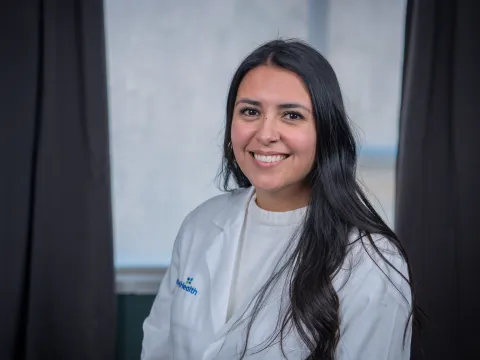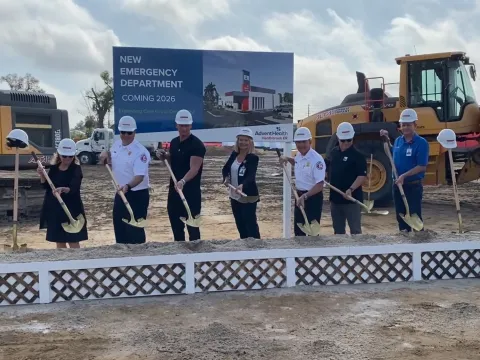- AdventHealth
Family Nurse Practitioner, Ashley McKillip with AdventHealth Medical Group Gastroenterology at Louisville and AdventHealth Avista shares what you need to know about colorectal cancer screenings and prevention:
Current national guidelines recommend people at average risk of colon cancer begin colon cancer screening at age 45. Acceptable forms of colon cancer screening include colonoscopy, stool-FIT-DNA (Cologuard) and FIT testing.
Colonoscopies remain the gold standard of testing, because they allow the opportunity to remove colon polyps before they have the potential to turn into a cancer, therefore preventing colon cancer. Colon cancer can be prevented with screenings. If you have no symptoms and no family history of colon cancer or pre-cancerous colon polyps, screening at age 45 is the appropriate time to begin screening.
There are not always signs of colon cancer, and early-stage colon and rectal cancer often show no symptoms. Signs of colon cancer can include a change in bowel habits, persistent abdominal discomfort, rectal bleeding, fatigue and unexplained weight loss. If any of these are occurring, people should meet with their primary care providers or gastroenterologist team.
Colorectal cancer facts and statistics:
-Colorectal cancer is the fourth most commonly diagnosed cancer in the United States.
-It is the second leading cause of cancer deaths.
-It is highly treatable when detected early.
-Colorectal cancer is rising in young adults
-Young adults are the only population group experiencing an increase in colorectal cancer, and it's currently the deadliest cancer among young men and the second deadliest among young women.
-Treatment options vary for individuals, but can include surgery, chemotherapy, radiation and other therapies
Factors contributing to an increase in early onset colon cancer (before age 45)
-A diet high in processed foods and red meats
-Obesity
-Alcohol consumption
-Sedentary behavior
-Chemicals in the environment
-Antibiotic use
The Colorectal Cancer Alliance has numerous resources for people interested in learning more about screening, prevention, treatment options and support.
Resources:
https://www.aacr.org/patients-caregivers/awareness-months/colorectal-cancer-awareness-month/

Ashley McKillop, DNP, FNP-C is a board-certified family nurse practitioner with extensive experience treating gastroenterology and hepatology patients. She is a highly experienced practitioner, providing care for a variety of conditions, including IBD, IBS, GERD, gastroparesis, gallbladder disease, autoimmune disorders, fatty liver disease and hepatitis.
Ashley received her RN degree from Santa Barbara City College and went on to earn her Bachelor of Science in Nursing degree from Sacred Heart University. Ashley received her Doctor of Nursing Practice degree from Arizona State University.
Ashley is passionate about preventing chronic disease. She strongly believes that it is important to explore ways to improve her patients’ overall health by improving their gut health. In her free time, Ashley enjoys traveling and hiking, traveling, cooking and being with family.
If you’d like to schedule an appointment with Ashley, click here: Ashley McKillop, DNP, FNP-C | Gastroenterology | Louisville, CO | AdventHealth
Recent News

Local leaders, officials, and construction workers gathered today to commemorate a major milestone in the expansion underway at AdventHealth Daytona Beach: placing the final steel beam.

AdventHealth is excited to introduce Eugenio L. Menendez, DO, FACP, to our community of care. He is joining the team at AdventHealth Medical Group Family Medicine at Hendersonville* following the...

AdventHealth Heart of Florida and AdventHealth Polk Foundation leaders are delighted to unveil a new courtesy visitor shuttle meant to enhance accessibility and comfort for patients.

Dr. Jeffrey Keen, a board-certified orthopedic surgeon specializing in adult reconstruction, orthopedic surgery, robotic-assisted surgery, and sports medicine, has returned to AdventHealth Medical...

In recognition of National Donate Life Month, nearly 300 transplant patients and their families enjoyed AdventHealth’s 2025 transplant reunion.

By managing ASCs as distinct entities with tailored operations, financial structures, and physician partnerships, the East Florida Division is fostering collaboration, efficiency, and growth.

According to the National Kidney Foundation, more than 101,000 people are currently on the organ transplant list in need of a new kidney. However, only about 17,000 transplants happen each year —...

The AdventHealth Board of Directors has appointed David Banks as the organization’s new president/CEO, effective immediately.

AdventHealth is excited to welcome Shalom Littrell, LCSWA, to its team at AdventHealth Medical Group Psychiatry at Medical Office Building*. Littrell is a Licensed Clinical Social Work Associate and...

The AdventHealth Heathbrook ER will have 12 exam rooms, including a resuscitation room, a bariatric room, an isolation room, obstetrics-friendly room and pediatric-friendly rooms.

Ming Wu, MD -- a family medicine doctor with AdventHealth Littleton -- talks about the ways to lessen the impact of seasonal allergies this spring.

The East Florida Division is forming strong partnerships with independent physicians, driving mutual success and improving hospital throughput.
